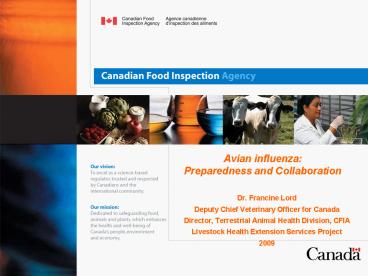Avian influenza: Preparedness and Collaboration - PowerPoint PPT Presentation
1 / 27
Title:
Avian influenza: Preparedness and Collaboration
Description:
... practice response exercises, awareness campaigns, identifying emerging diseases ... Carcasses are disposed of in an environmentally acceptable fashion. ... – PowerPoint PPT presentation
Number of Views:91
Avg rating:3.0/5.0
Title: Avian influenza: Preparedness and Collaboration
1
Avian influenza Preparedness and Collaboration
- Dr. Francine Lord
- Deputy Chief Veterinary Officer for Canada
- Director, Terrestrial Animal Health Division,
CFIA - Livestock Health Extension Services Project
- 2009
2
One World One Health
- Understanding linkages between
- Human health
- Animal health
- Ecosystem health
3
Animal Health Program
- The program draws on the authority of the
Canadian Health of Animals Act and Regulations. - The program is also supported by a policy
- framework that accords with the
internationally accepted animal health
authorities such as the World Organisation for
Animal Health (OIE).
4
Disease Control
- The CFIA develops import controls, active
surveillance plans and emergency preparedness
measures.
5
Federally Reportable Disease
- In Canada, highly pathogenic AI (HPAI) is a
federally reportable disease - Producers
- Veterinarians
- Laboratories
- Must notify the CFIA of all suspected or
confirmed cases
6
OIE definition (January 2006)
7
Disease Control responsibility shared with
provincial governments
8
Government Partners Avian Influenza and
Pandemic Influenza
- Public Health Agency of Canada
- Canadian Food Inspection Agency
- Health Canada
- Public Safety Canada
- Foreign Affairs and International Trade Canada
- Treasury Board Secretariat
- Canadian International Development Agency
- Canadian Institutes of Health Research
- Provinces and Territories
- World Health Organization
9
Coordination within Canada
- The PHAC developed a plan entitled Canadian
Pandemic Influenza Plan for the Health Sector. - In the event of human illnesses related to AI,
the goal of this plan is to provide guidance for
provincial health care authorities who would
respond to the outbreak to minimize serious
illness and deaths.
10
Laboratory preparedness Laboratory network
- 21 laboratories in CFIA (research and diagnostic
services) - Accredited laboratories (private and provincial)
also perform - Canadian Animal Health Surveillance Network
11
Avian Influenza Prevention and Preparedness in
Canada
- Import restrictions
- Securing our border
- Surveillance
- Biosecurity
- International Cooperation
12
Avian Influenza Import Restrictions and
Securing our Border
Only healthy animals and animal products and
by-products which meet the import health
requirements of an importing country are exported
from Canada, and imported into Canada.
12
13
Federal Surveillance infrastructure
- CFIA is the Veterinary Administration as
defined by the OIE - Strong central legislative authority to control
animal health and to facilitate eradication of
diseases - Regulations for Disease Reporting - Reportable
diseases - - Immediately notifiable
diseases - - Annually notifiable
diseases - In Canada, federal responsibility for agriculture
supersedes that of province
14
Avian Influenza Surveillance
- Canadian Wild Bird Survey
- Managed by the Canadian Cooperative Wildlife
Health Centre (CCWHC) - A joint initiative between federal, provincial
and territorial governments as well as the and
Canada's Avian Influenza Laboratory Network - Domestic commercial poultry industry
surveillance - The Canadian Notifiable Avian Influenza
Surveillance System (CanNAISS)
15
CanNAISS is a surveillance system
- Surveillance The systematic ongoing collection,
collation, and analysis of data, and the timely
dissemination of information to those who need to
know so that action can be taken. - Surveillance system A method of surveillance
that may involve one or more components of
activities that generates information on the
health, disease or zoonoses status of animal
populations.
16
The six surveillance componentsof the NAI
surveillance system
17
Avian Influenza Response Lessons learned BC
2004
18
Avian Influenza Response Lessons learned BC
2004
19
High pathogenic outbreak in 2004
20
Lessons learned BC 2004
- Successful response
- Found virus before it mutated
- Controlled highly contagious disease with
relatively little spread - Legislation was tested and held
- 17 Lessons Learned and Action Plan
- All enhance FAD preparedness
- All related to 5 different areas
- Leadership
- Intelligence and Information Management
- Processes and Protocols
- Communications and Linkages
- Capacity (staffing)
21
AI Response
- While specific response elements vary based on
the virus and infected poultry species, the
CFIA's actions generally include - movement restrictions
- animal disease controls
- Strict quarantines
- Destruction of infected birds
- surveillance components
22
Movement restrictionsSurveillance and
Protection Zones
- Control Area is established by Ministerial Order
- Two different zones are created around the
infected area - Protection zone
- Radius of 3 km from the infected farm
- Last for a minimum of 21 days from the
- date the virus was identified.
- Surveillance Birds within the zone will be
- sampled and tested.
- Strict biosecurity measures will be in force
- Surveillance zone
- Radius of 10 km from the infected farm
- will last for a minimum of 21 days from the date
the virus is identified. - All domestic or captive bird flocks will be
identified.
23
Disease Containment
- All infected flocks are humanely destroyed
- Carcasses are disposed of in an environmentally
acceptable fashion. - For HPAI, nearby and contact flocks are also
humanely destroyed and disposed of as a
pre-emptive measure.
24
Surveillance and Quarantine
- Quarantines restricting the movement of poultry
and poultry products are placed on infected
premises, poultry operations located in the
vicinity of infected premises and other poultry
operations that may have had contact with
infected premises. - Surveillance Birds from quarantined premises are
tested and monitored for evidence of AI
infection
25
Disease containment cleaning and disinfection
26
Restock the birds and stay smart about poultry
biosecurity
27
27

